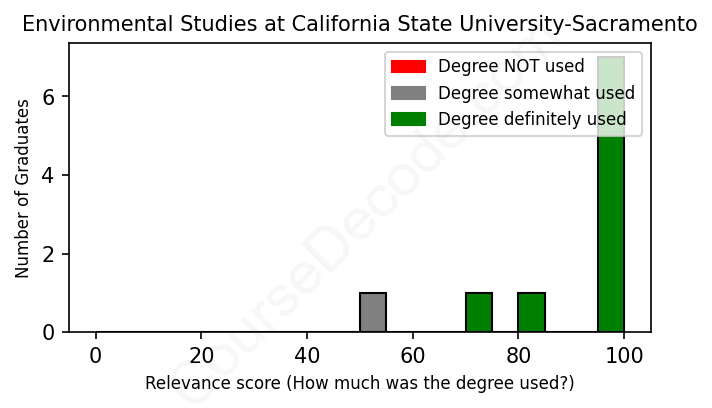
First, some facts. Of the Environmental Studies graduates from California State University-Sacramento we've analyzed , here's how many have used (or NOT used) their degree in their career:

These are estimates based on AI analysis of 10 LinkedIn profiles (see below).
The verdict? Great! Overall, with an average relevance score of 89%, Environmental Studies graduates from California State University-Sacramento have a substantially higher likelihood (+22%) of finding work in this field compared to the average graduate across all fields:
And for comparison, here's the chart for all profiles we've looked at across all degrees.
Also, after graduating, only 20% of these graduates have pursued further education other than another Bachelor's degree (such as a Masters degree or other), compared to the average across all profiles of 35%. This suggests a Bachelors degree is enough for most Environmental Studies graduates, and it's normal to look for work straight after graduation.
See the details:
|
Relevance score: 71% We think this person has gone into a career highly relevant to their degree. We think this person has gone into a career highly relevant to their degree.
DEGREE INFOGraduated in 2020 from California State University-Sacramento with a Bachelor of Science - BS in Environmental Studies. No other secondary education since. JOB HISTORY SINCE GRADUATIONPark Aide California State Parks Apr 2021 - Oct 2021 Watershed Conservation and Land Use Advocate  Foothill Conservancy Oct 2021 - Sep 2022 Cone Corps Nursery Technician USFS Placerville Nursery  Sierra Nevada Alliance Oct 2022 - Present ABOUTI am a motivated Environmental Studies graduate with forestry, environmental advocacy, and wildlife rehabilitation experience. I am passionate about protecting the Sierra Nevada for generations to come and preserving the character of the communities within it. |
The top 10 most common jobs done by the graduates we've analyzed (ranked most common to least) are:
Looking at the jobs held by graduates from California State University-Sacramento with a degree in Environmental Studies, it’s clear that a decent number of them have taken roles that really connect with the field. Many of these graduates have landed positions like Environmental Scientists, Biologists, and Technicians, where they actively apply the ecological and environmental skills they honed in school. This includes work in wildlife conservation, ecological assessments, and even environmental policy at places like the California Energy Commission. Internships and entry-level positions in research and environmental monitoring also seem to be quite common, which makes sense given that many graduates start their careers in roles that help them gain essential field experience.
However, it’s not all rainbows and butterflies. Some graduates found themselves in jobs that don’t directly relate to Environmental Studies, like maintenance roles or pest control, which may only require some basic ecological knowledge. Overall, while there certainly are a variety of jobs reflecting a strong tie to the environmental field, it’s apparent that not every graduate is directly working in a position that fully utilizes their specialized education. But for those who landed in relevant roles, they’re likely doing some exciting work that contributes to environmental conservation and sustainability!
Here is a visual representation of the most common words in job titles for Environmental Studies graduates (this is across all Environmental Studies graduates we've analyzed, not just those who went to California State University-Sacramento):

Graduates from the Environmental Studies program at California State University, Sacramento seem to have diverse career paths, especially in their first few years after college. Many of them kick off their careers with internships or entry-level positions that are directly related to environmental science, biology, or conservation, like working as interns at various environmental organizations or taking roles with government agencies such as the U.S. Fish and Wildlife Service. It’s common to see them being hired as biological technicians or environmental scientists fairly soon after graduation. They tend to transition into more specialized roles like Environmental Planner or Sustainable Business Program Manager as they gain more experience, usually within five years. This shows that graduates are often able to find relevant jobs early on, which is a promising sign for new graduates considering this field.
Looking further down the line, around ten years post-graduation, many alumni appear to have established themselves in solid positions within the environmental sector. They often hold titles like Senior Environmental Scientist, Biologist, or even specialized roles like Consulting Utility Forester. It seems that the connections and experience gathered through internships and early jobs provide a good foundation for advancement in their careers. However, there are also instances where individuals have had to shift gears into less directly related jobs or short-term roles, suggesting there can be some bounce-around in employment, especially in the early job market. Overall, while not every grad has a straight path to a high-level job, many are managing to stick to careers relevant to Environmental Studies, which holds a lot of potential for making an impact.
Honestly, a Bachelor’s degree in Environmental Studies at California State University-Sacramento is pretty manageable, especially if you're interested in the subject. It's not typically one of the hardest degrees you can pursue, but it does come with its challenges, like completing group projects, research papers, and some science courses that might require a bit of math or analysis. If you're passionate about environmental issues and enjoy working on sustainability projects, you'll probably find the coursework engaging rather than super tough. Just make sure you stay on top of your assignments and don't be afraid to ask for help when you need it, and you should do just fine!
Most commonly, in the LinkedIn profiles we've looked at, it takes people 4 years to finish a Bachelor degree in Environmental Studies.
Looking at the job histories of these Environmental Studies graduates from California State University-Sacramento, it seems like they’ve had a pretty mixed bag in terms of earnings. Many of the earlier career paths started with internships and lower-level positions like maintenance helpers or taxonomists, which typically don’t pay well, especially right out of school. However, it appears that as time went on, many of them transitioned into more specialized roles like environmental scientists and planners, which usually pay better. Those who landed jobs at government agencies or well-established consultancies seem to have stabilized their income over the years, while some others have been juggling multiple on-call positions, which might mean inconsistent pay. Overall, while the entry-level gigs might not have been anything to write home about, it looks like a few have climbed the ladder and are making decent money now—especially for a field that’s all about promoting sustainability and environmental care!
Here is a visual representation of the most common words seen in the "about" section of LinkedIn profiles who have a Bachelor degree in Environmental Studies (this is across all Environmental Studies graduates we've analyzed, not just those who went to California State University-Sacramento). This may or may not be useful:

Here are all colleges offering a Bachelor degree in Environmental Studies (ordered by the average relevance score of their Environmental Studies graduates, best to worst) where we have analyzed at least 10 of their graduates:
| College | Score | Count |
|---|---|---|
 California State University-Sacramento California State University-Sacramento
|
89 | 10 |
 University of Vermont University of Vermont
|
72 | 21 |
 University of California, Santa Barbara University of California, Santa Barbara
|
69 | 24 |
 University of California, Santa Cruz University of California, Santa Cruz
|
59 | 31 |
 Florida State University Florida State University
|
57 | 10 |
 University of Washington University of Washington
|
57 | 13 |
 UC Santa Barbara UC Santa Barbara
|
57 | 15 |
 University of Oregon University of Oregon
|
56 | 13 |
 University of Colorado Boulder University of Colorado Boulder
|
53 | 24 |